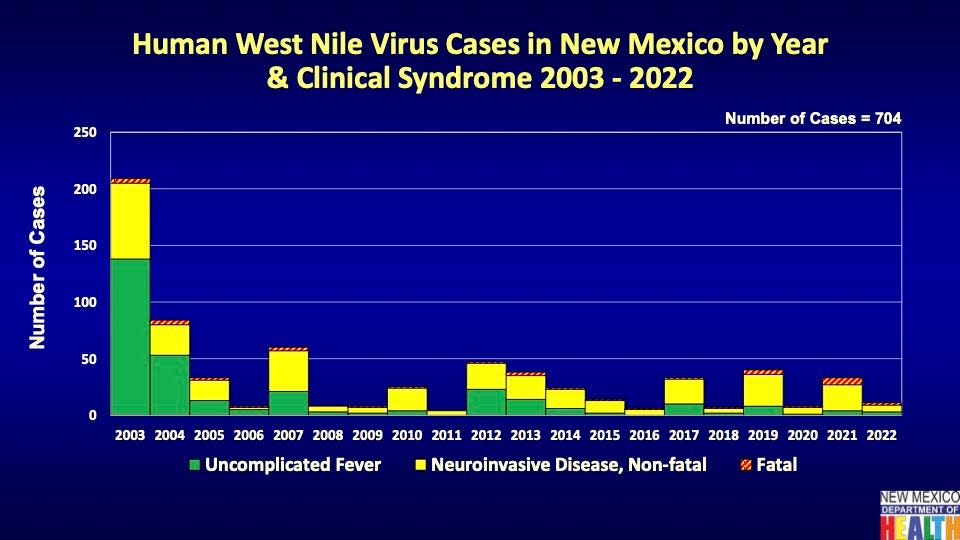New Mexico has first 2 human cases of West Nile virus this year. How to protect yourself
The New Mexico Department of Health confirmed the first human cases of West Nile virus of 2023 in July. But what is this illness and how can you protect yourself?
What is West Nile virus?
According to the Centers for Disease Control and Prevention, West Nile virus is “the leading cause of mosquito-borne disease in the continental United States” and is closely related to yellow fever, Dengue fever, Zika virus and other diseases transmitted by mosquitoes.
The virus itself spreads to people through bites from infected mosquitoes. It can cause symptoms that range in severity and lead to death in extreme cases.
West Nile cases increase in number during mosquito season, which begins in May and can last well into the fall months.
The CDC reports that most people experience no symptoms and may not realize they are infected with the virus. About one in five people infected experience a fever and other mild symptoms, while about one in 150 people infected develop serious symptoms which are sometimes fatal.
About West Nile virus cases recorded in New Mexico
The NMDOH noted in a news release in late July that the state recorded 11 human infections of West Nile virus in 2022, including two deaths. The state recorded its first two cases of human infection for 2023 in July.
One patient was from Lea County and the other was from Sandoval County. Both patients were hospitalized but recovering. The state also identified one case in a Sierra County horse.
Cases have been reported in New Mexico each season since 2003. The number of cases has decreased from over 200 cases in 2003 to less than 50 cases each year since 2007.

'Urgently re-evaluate water priorities': Are pecans driving New Mexico's drought? Heat, lack of rain predicted in coming weeks
Signs and symptoms of the virus
Fever, headache, body aches, joint pain, vomiting, diarrhea and rash are all symptoms of febrile illness due to West Nile, according to the CDC. The organization said most people who develop this illness will make a full recovery, though fatigue and weakness can last for weeks to months.
More serious illness caused by the virus can target the central nervous system, causing encephalitis or meningitis – inflammation of the brain or of the membranes surrounding the brain and spinal cord. These symptoms include high fever, headache, neck stiffness, vision loss, numbness and paralysis.
Those aged 60 and over or who have preexisting conditions are at higher risk of developing severe illness.
“Recovery from severe illness might take several weeks or months. Some effects to the central nervous system might be permanent,” the CDC website reads.
Read more: Three Las Cruces police officers shot at while responding to apartment call. What we know.
There are currently no specific treatments for the virus nor vaccines to prevent infection.
How to protect yourself from West Nile virus
Protecting yourself from the virus requires taking precautions against mosquito bites. In a news release, the NMDOH recommends people:
Use an approved insect repellent every time you go outside and follow the instructions on the label. Among the EPA-approved repellents are those that contain DEET, picaridin, IR3535 and oil of lemon eucalyptus/para-menthane-diol.
Eliminate water-holding containers where mosquitoes lay their eggs, such as old tires, empty cans, and other unneeded outdoor items that can hold water.
Drain the water in birdbaths, wading pools, and saucers under potted plants weekly.
Make sure rain barrels are tightly screened.
Wear long sleeves and pants at dawn and dusk when mosquitoes are most active.
Keep windows and doors closed if not screened. If you leave your house doors or windows open, make sure they have screens that fit tightly and have no holes.
Horse owners are also encouraged to vaccinate their animals and protect them from mosquito-borne illness, which includes West Nile virus and Western equine encephalitis.
Read more: Take a look behind the scenes of Las Cruces' latest film production, 'In the Summers'
People are encouraged to contact a health care provider if they suspect they have been infected with the virus and are experiencing symptoms.
Leah Romero is the trending reporter at the Las Cruces Sun-News and can be reached at 575-418-3442, LRomero@lcsun-news.com or @rromero_leah on Twitter.
This article originally appeared on Las Cruces Sun-News: What to know about West Nile virus in New Mexico after 3 cases reported

